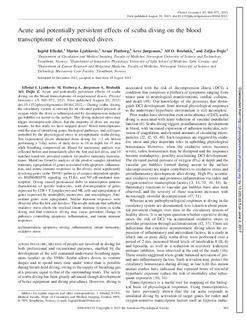| dc.contributor.author | Eftedal, Ingrid | |
| dc.contributor.author | Ljubkovic, Marko | |
| dc.contributor.author | Flatberg, Arnar | |
| dc.contributor.author | Jørgensen, Arve | |
| dc.contributor.author | Brubakk, Alf O | |
| dc.contributor.author | Dujic, Zeljko | |
| dc.date.accessioned | 2017-11-17T08:55:23Z | |
| dc.date.available | 2017-11-17T08:55:23Z | |
| dc.date.created | 2013-11-06T09:15:45Z | |
| dc.date.issued | 2013 | |
| dc.identifier.citation | Physiological Genomics. 2013, 45 (20), 965-972. | nb_NO |
| dc.identifier.issn | 1094-8341 | |
| dc.identifier.uri | http://hdl.handle.net/11250/2466798 | |
| dc.description.abstract | During scuba diving, the circulatory system is stressed by an elevated partial pressure of oxygen while the diver is submerged and by decompression-induced gas bubbles on ascent to the surface. This diving-induced stress may trigger decompression illness, but the majority of dives are asymptomatic. In this study we have mapped divers' blood transcriptomes with the aim of identifying genes, biological pathways, and cell types perturbed by the physiological stress in asymptomatic scuba diving. Ten experienced divers abstained from diving for >2 wk before performing a 3-day series of daily dives to 18 m depth for 47 min while breathing compressed air. Blood for microarray analysis was collected before and immediately after the first and last dives, and 10 matched nondivers provided controls for predive stationary transcriptomes. MetaCore GeneGo analysis of the predive samples identified stationary upregulation of genes associated with apoptosis, inflammation, and innate immune responses in the divers, most significantly involving genes in the TNFR1 pathway of caspase-dependent apoptosis, HSP60/HSP70 signaling via TLR4, and NF-κB-mediated transcription. Diving caused pronounced shifts in transcription patterns characteristic of specific leukocytes, with downregulation of genes expressed by CD8+ T lymphocytes and NK cells and upregulation of genes expressed by neutrophils, monocytes, and macrophages. Antioxidant genes were upregulated. Similar transient responses were observed after the first and last dive. The results indicate that sublethal oxidative stress elicits the myeloid innate immune system in scuba diving and that extensive diving may cause persistent change in pathways controlling apoptosis, inflammation, and innate immune responses. | nb_NO |
| dc.language.iso | eng | nb_NO |
| dc.publisher | American Physiological Society | nb_NO |
| dc.title | Acute and potentially persistent effects of scuba diving on the blood transcriptome of experienced divers | nb_NO |
| dc.type | Journal article | nb_NO |
| dc.type | Peer reviewed | nb_NO |
| dc.description.version | publishedVersion | nb_NO |
| dc.source.pagenumber | 965-972 | nb_NO |
| dc.source.volume | 45 | nb_NO |
| dc.source.journal | Physiological Genomics | nb_NO |
| dc.source.issue | 20 | nb_NO |
| dc.identifier.doi | 10.1152/physiolgenomics.00164.2012 | |
| dc.identifier.cristin | 1063234 | |
| dc.relation.project | Norges forskningsråd: 220546 | nb_NO |
| dc.description.localcode | © 2013 American Physiological Society. Open access. | nb_NO |
| cristin.unitcode | 194,65,25,0 | |
| cristin.unitcode | 194,65,15,0 | |
| cristin.unitname | Institutt for sirkulasjon og bildediagnostikk | |
| cristin.unitname | Institutt for kreftforskning og molekylær medisin | |
| cristin.ispublished | true | |
| cristin.fulltext | original | |
| cristin.qualitycode | 1 | |
